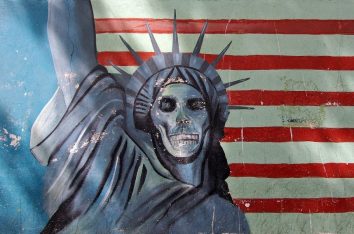Those who have been following my work will know that I have been highlighting the concept of “Exile” as a kind of catch-all category to describe ideas like divine weakness, folly, and (what Luther called) the theology of the cross. Further, I am placing Exile in contradistinction from “Empire,” which is the source of ideas like dogma, canon, and heresy.
In a word, Exile refers to a suspicion of Empire.
So when pastors and theologians make bold, imperial proclamations like “[Concept X] is dogma and absolutely essential to the Christian faith,” or, “These 27 books alone constitute the New Testament,” Exile responds not by replacing those strong claims with different, equally strong ones, but instead with side-eye, with a skeptical glance, and with something like, “Oh is that right?”
(Sarcasm may also be involved.)
Over the past several years I have been exploring the work of authors and thinkers such as Diarmuid O’Murchu, John Caputo, Gregory Boyd, Kester Brewin, Peter Rollins, Diana Butler Bass, Dietrich Bonhoeffer, Pete Enns, Brian McLaren, David Dark, and others. I’d like to begin a series of posts and videos integrating some of these thinkers’ ideas with my own theology of Exile (or as Caputo would want to call it, theopoetics of Exile).
More specifically, I want to bring influences like divine nonviolence, religionless Christianity, quantum theory, and radical theology to bear upon Exile in an effort to bolster its strong commitment to divine weakness and the folly of the cross.
Off we go, then. . . .
Let’s start with a simple observation: Something’s not quite right. We as humans recognize — albeit sometimes only faintly — that there is a void or a lack within us. Often this realization is virtually stillborn, almost dead-on-arrival, because immediately upon sensing this inner void we externalize it, projecting it onto some object outside of us (usually some group or community). Then once we have projected our inner dis-ease upon this external group, we make that group the object of all our misplaced anger and frustration.
Further, we reason within ourselves that this turmoil we feel must be temporary — a kind of aberration or parenthetical speedbump along life’s way that we should strive to overcome (a “glitch in the Matrix,” as it were). We imagine that there must have been a time in the past when things were better, and there must be a future period ahead of us when this threat to our well-being will be dealt with and we can be happy and whole again.
This is textbook scapegoating.
The imagined “Golden Age” is just over the horizon, just around the bend, and once the scapegoat has been neutralized the utopian ideal can finally be realized.
A perfect example of this process is the whole MAGA mentality. The entire movement stems from the idea that there was a time in our nation’s history when America was “great,” and we need to recover that mojo so that America can be “great again.”
So what is the scapegoat impeding our greatness? Well, take your pick these days, but one obvious answer is the immigrant community south of our border (you know, all those disease-riddled rapists from shit-hole countries infesting our holy land). If we can just rid ‘Merca of these a’here vermin (so the thinking goes) then we will recapture those beautiful-for-spacious skies and amber waves of blah blah blah, you know the rest.
But what if it’s all bullshit?
I don’t mean just the “Make America Great Again” stuff, I mean this entire way of thinking — What if the real mistake here has nothing to do with the manner in which we are seeking to overcome the void, but instead, what if the mistake is the idea that we can avoid the void in the first place?
A video version of this article can be seen here.
Stay tuned, more to come. . . .




[…] and strong theology — in a word, it’s an expression of Empire. By its very nature Exile is suspicious of […]